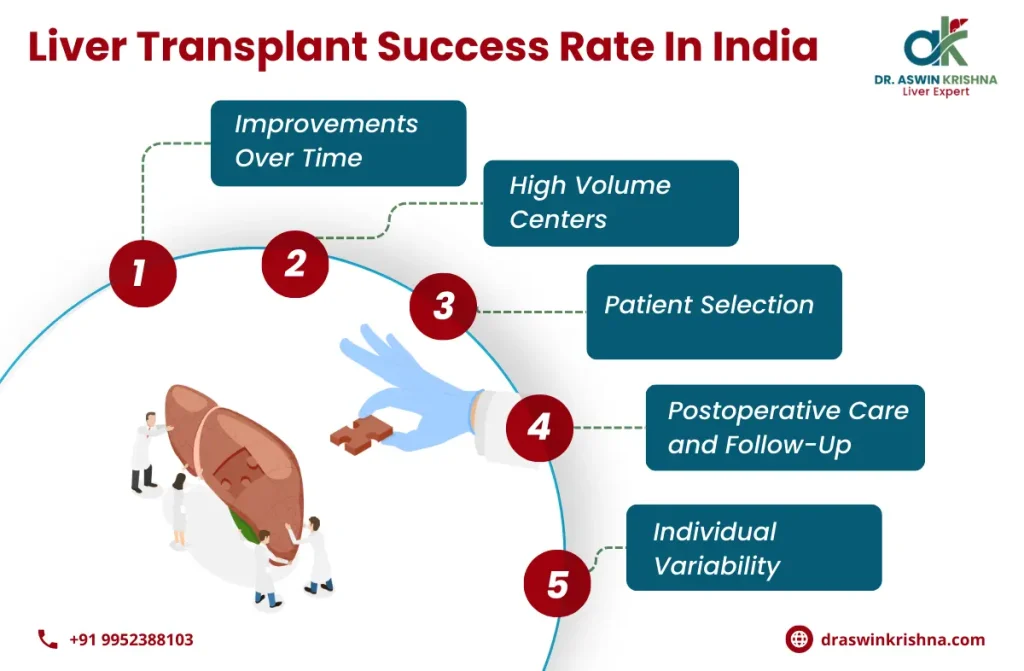Liver transplantation is a complex yet life-saving procedure for patients with end-stage liver diseases or acute liver failure. Over the years, India has become a global destination for liver transplants, thanks to advanced medical technology, skilled surgeons, and relatively affordable treatment costs. In this article, we explore the Liver Transplant Success Rate in India by covering essential aspects like success factors, statistics, and the recovery process.
Understanding Liver Transplants
A liver transplant is a surgical procedure in which a diseased liver is replaced with a healthy liver from a donor. It is typically considered when the liver is no longer functional due to chronic conditions such as cirrhosis, hepatitis, or liver cancer. Transplants are either from living donors, where a portion of the liver is transplanted, or from deceased donors, where the entire liver is used. Due to the liver’s remarkable ability to regenerate, even partial transplants can be highly effective.
Significance of Success Rates
- Improved Life Expectancy: The liver transplant success rate in India has significantly improved, with survival rates of 85% to 90% in the first year post-transplant. Many patients lead a healthy life for decades.
- Advanced Medical Technology: The availability of robotic and minimally invasive techniques has enhanced precision, reducing complications and increasing survival rates.
- Specialized Post-Transplant Care: Leading hospitals in India provide comprehensive post-operative care, ensuring lower rejection rates and better recovery outcomes.
- High-Quality Donor Organs: Both living donor and cadaveric liver transplants contribute to increasing success rates, with living donor transplants often yielding better results.
Factors Influencing Liver Transplant Success
- Patient’s Health Condition: Patients without severe comorbidities (diabetes, heart disease) have higher success rates.
- Experience of Surgeons & Hospitals: Top-tier hospitals in India with specialized liver transplant teams contribute to higher survival outcomes.
- Type of Liver Transplant: Living donor transplants have a higher success rate compared to cadaveric transplants due to better organ compatibility.
- Post-Transplant Care & Medication: Adherence to immunosuppressive therapy and a healthy lifestyle significantly improve long-term survival.
With continuous advancements in transplant techniques, the liver transplant success rate in India continues to rise, making it a preferred destination for patients seeking high-quality, affordable liver transplants.
Liver Transplant Success Rate in India
Liver transplantation in India has seen remarkable success due to the involvement of highly skilled specialists and advanced medical facilities. The survival rate after liver transplant in India has significantly improved, reaching approximately 85-90% one-year survival rate post-transplant.
Key Specialists Involved in Liver Transplantation:
- Hepatologist Specialist: Manage liver diseases and patient evaluations.
- Transplant Surgeons: Perform intricate liver transplant surgery.
- Anesthesiologists: Ensure safe anesthesia during surgery.
- Radiologists: Assist with imaging and diagnostics.
- Pathologists: Conduct biopsy analyses to check for liver disease.
- Nurses and Coordinators: Provide pre and post-operative care and patient support.
Success Rates of Liver Transplant
India is recognized globally for its expertise in performing successful liver transplants. The Liver Transplant Success Rate in India varies depending on several factors, but overall, it ranges between 85% and 90% in the first year after surgery. The liver transplant survival rate in India is also among the highest in the world, with long-term survival rates extending beyond 80% for five years post-transplantation.
Some key statistics include:
- First-year survival rates: 85-90%
- Five-year survival rates: 75-80%
- Pediatric liver transplant success rates: 90-95%

Success Rates by Age
The liver transplant survival rate in India differs by age group, as age-related factors such as immunity, comorbidities, and organ regeneration capabilities come into play.
- Children (0-18 years): Children tend to have the highest success rates due to their strong regenerative capacity. Pediatric liver transplant success rates in India are as high as 90-95%.
- Adults (18-50 years): Adult patients also show high success rates, typically ranging from 85-90% in the first year.
- Elderly (above 50 years): While liver transplant surgeries are still successful in elderly patients, the Success of Liver Transplant Surgery in India in this group tends to be lower due to age-related factors, typically between 75-80%.
Factors Influencing Success Rate
Several factors influence the liver transplant success rate in India:
- Timely diagnosis: Early detection and timely transplantation play a crucial role in the success of the surgery.
- Health of the donor organ: The quality and compatibility of the donor organ significantly affect the outcome.
- Post-transplant care: Proper immunosuppressive medication and infection prevention are essential for ensuring long-term success.
- Underlying medical conditions: Patients with coexisting conditions such as diabetes, heart disease, or obesity may have lower success rates.
- Age and general health: Younger patients and those without severe comorbidities tend to have higher survival rates after a liver transplant.
Which Specialists are involved in Liver Transplantation?
A successful liver transplant requires a multidisciplinary team of highly skilled specialists who collaborate to ensure the patient’s safety and well-being. Key professionals involved in liver transplant surgery include:
- Hepatologists: These are liver specialists responsible for diagnosing liver diseases and determining whether a liver transplant is necessary.
- Transplant Surgeons: These experts perform liver transplant surgery, meticulously removing the damaged liver and replacing it with a healthy donor organ.
- Anesthesiologists: They manage anesthesia during the surgery to ensure the patient’s comfort and safety.
- Radiologists and Imaging Specialists: Responsible for pre-surgery imaging tests to assess the condition of the liver and surrounding organs.
- Transplant Coordinators: These professionals help with the logistics of organ transplantation, including donor matching and patient preparation.
- Post-Transplant Care Team: This team includes nurses, physical therapists, and dietitians who guide patients through recovery and lifestyle changes post-surgery.
Can you live a normal life after a Liver Transplant?
Yes, many patients go on to live a full, healthy life after a liver transplant survival rate in India. However, success largely depends on following medical advice, making lifestyle adjustments, and attending regular check-ups to monitor the liver’s health. Here’s what post-transplant life typically involves:
- Lifestyle Changes: A balanced diet, moderate exercise, and avoiding alcohol and smoking are essential for longevity.
- Medication Compliance: Patients must take immunosuppressive medications to prevent organ rejection. This requires adherence to a strict schedule and regular medical supervision.
- Regular Health Monitoring: Frequent check-ups with your healthcare provider will help detect any complications early.
Tips for a Healthier Life Post-Transplant:
- Maintain a diet rich in fruits, vegetables, lean proteins, and whole grains.
- Avoid contact with individuals who are ill to protect your immune system.
- Engage in moderate physical activities, such as walking or light stretching, to regain strength.
With proper care, patients can enjoy a high quality of life, making the survival rate after liver transplant in India favorable for most.
The Reason for Liver Transplants
The Success of Liver Transplant Surgery in India lies in its ability to extend life expectancy and improve the quality of life for patients with severe liver conditions. Liver transplants are recommended when the liver has suffered irreparable damage, and without a transplant, the patient’s life expectancy is severely reduced. The rationale is that a functional liver is critical for various bodily processes, including detoxification, protein synthesis, and digestion.
For patients suffering from conditions like liver cirrhosis, acute liver failure, or primary liver cancer, a transplant becomes the only viable treatment option. The timely intervention significantly boosts the liver transplant success rate in India, enabling patients to regain normal life functions.
Recovery Process after a Liver Transplant
The recovery process after a liver transplant success rate in India is divided into several stages, each crucial to achieving a successful outcome. Here’s an overview:
Immediate Post-Surgery (First Week)
- Patients remain in the intensive care unit (ICU) for 3-5 days for close monitoring.
- Medications are administered to prevent organ rejection and fight infections.
- Most patients can start walking within a week post-surgery.
Early Recovery (First 3 Months)
- Regular follow-ups are scheduled to monitor liver function and overall recovery.
- Immunosuppressant drugs are prescribed to prevent the body from rejecting the new liver.
- Patients must follow a strict diet and avoid heavy physical activity.
Long-Term Recovery (6-12 Months)
- After 6 months, patients can gradually return to normal activities, including work.
- Lifestyle changes, including a healthy diet and avoiding alcohol, are crucial for maintaining liver health.
- Regular health checkups continue to ensure there are no complications.
Full Recovery (Beyond 1 Year)
- By the end of the first year, the liver fully integrates into the body, and patients enjoy an improved quality of life.
- At this stage, the survival rate after liver transplant in India stabilizes, with minimal risk of complications if proper post-transplant care is followed.
Why is a Liver Transplant Done?
A liver transplant is often advised for individuals suffering from end-stage liver disease when their condition is life-threatening and other treatments have failed. Without a liver transplant, these individuals are at high risk of mortality. It becomes a crucial intervention for those with chronic liver disease or experiencing rapid liver failure.
Primary Reasons for Liver Transplants
- Liver Cirrhosis: The leading cause of liver transplants in adults, characterized by the replacement of healthy liver tissue with scarred tissue. Causes of cirrhosis include:
- Alcohol abuse
- Autoimmune hepatitis
- Biliary atresia (a liver disease in newborns)
- Chronic hepatitis B or chronic hepatitis C
- Nonalcoholic fatty liver disease
- Metabolic disorders
Factors Considered for Liver Transplant Eligibility
- The severity of Condition: How advanced the liver disease is and its impact on the patient’s health.
- Other Medical Conditions: Any existing health issues that might affect the success of liver transplant surgery in India.
- Medical History: Previous illnesses, especially those like tuberculosis or chronic infections such as HIV.
- Overall Physical Health: General health status and the ability to endure the transplant surgery.
- Mental Well-being: Psychological readiness and stability to undergo the procedure.
- Support System: Availability of family or friends to provide post-operative care and emotional support.
Before recommending a liver transplant success rate in India, doctors evaluate the potential for the surgery to be successful and extend the patient’s life. Candidates with chronic conditions that might compromise the success of the transplant may not be deemed suitable for the procedure.
Before and After Liver Transplant Surgery
Before the Liver Transplant Surgery
Before liver transplant surgery, patients undergo a full medical evaluation, including blood tests, scans, and psychological assessments. Donor matching is done based on blood type and body size.
- Lifestyle Adjustments: Quitting alcohol and smoking is mandatory, and patients must follow a liver-friendly, low-sodium diet.
- Infection Prevention: Vaccinations are given to reduce risks post-surgery.
- Mental Preparation: Psychological counseling and family support are crucial for recovery success.
The Success of liver transplant surgery in India and the overall Success Rate of Liver Transplant in India depend largely on pre-surgery care and preparation.
After the Surgery: Rising from the Ashes
Post-surgery, patients are closely monitored in the ICU to track liver function, prevent infections, and ensure stability.
- Immunosuppressive Medications: These are essential to prevent the body from rejecting the new liver and must be taken lifelong under medical guidance.
- Diet and Lifestyle: A balanced, low-fat diet and avoiding alcohol are critical. Patients must maintain hygiene and avoid crowded places to reduce infection risk.
- Regular Follow-ups: Liver function tests and ultrasounds are done regularly to ensure the transplant is working well.
The Survival rate after liver transplant in India has improved significantly due to advanced post-operative care, contributing to the rising Success Rate of Liver Transplant in India.
Common Outcomes and Complications
Liver transplant surgery offers renewed life for patients with end-stage liver disease, though outcomes can vary based on age, overall health, and post-operative care.
- Positive Outcomes: Most patients experience improved liver function, energy levels, and quality of life within months. The Success of liver transplant surgery in India continues to rise due to skilled surgeons and advanced medical facilities.
- Common Complications: These may include organ rejection, infections, bile duct leaks, or blood clots. Timely detection and proper medication help manage these effectively.
- Long-Term Management: Lifelong use of immunosuppressants and routine health monitoring are vital to prevent rejection and ensure sustained liver function.
With proper care, the Survival rate after liver transplant in India is promising, reflecting the steady improvement in infrastructure, follow-up systems, and the overall Success Rate of Liver Transplant in India.
Diet and Nutrition
Boost Your Beverage Choice:
- Coffee and Green Tea: Both are known for their protective effects against liver fibrosis.
Incorporate Tart Fruits:
- Grapefruit, Cranberries, and Apples: These fruits help in cleansing the liver.
Focus on Green Leafy Vegetables:
- Cabbage, Broccoli Sprouts, Spinach, Arugula, and Dandelion Greens: Act as natural detoxifiers, absorbing toxins from the bloodstream.
- Garlic and Beetroot: Known for their liver-cleansing properties.
Select Healthy Fats and Proteins:
- Walnuts, Avocados, Almonds: Support liver health by managing fat levels.
- Oatmeal: A nutritious grain that aids in liver function.
Opt for Beneficial Oils:
- Olive Oil: A healthy fat that enhances liver function by reducing fat accumulation.
Post-Transplant Care: A Key to Success
Post-transplant care is crucial in determining the Liver Transplant Success Rate in India. After surgery, patients require close monitoring to prevent complications like infections, rejection, and organ dysfunction. Regular follow-ups, blood tests, and imaging studies are essential to evaluate the functioning of the new liver. Lifestyle changes, including a nutritious diet, exercise, and avoiding alcohol, significantly contribute to long-term recovery. Immunosuppressive medications must be taken strictly as prescribed, as they prevent rejection but also increase vulnerability to infections, making compliance vital for the success of liver transplant surgery in India.
Challenges in Liver Transplants
- Organ Shortage and Donor Matching: One of the biggest challenges is the limited availability of suitable donors. In India, the liver transplant rate in India is impacted by awareness gaps, cultural barriers, and low deceased donor donations. Finding a compatible match on time is often difficult, delaying treatment.
- Post-Surgical Complications: Even after a technically successful surgery, complications like infections, bile leaks, or clotting issues can arise. These conditions demand intensive medical management and may influence the survival rate after liver transplant in India.
- Financial Burden: Liver transplants involve significant costs, including pre-surgical evaluations, surgery, and post-operative care. Many families find this difficult to manage, affecting access and overall success rate of liver transplant in India.
- Long-Term Medication Adherence: Patients must continue immunosuppressive drugs for life. Missing doses can lead to rejection, while prolonged use increases risks of diabetes, hypertension, or kidney dysfunction, requiring lifelong monitoring.
Innovations Driving Success in India
- Living Donor Liver Transplants (LDLT): India has emerged as a global leader in LDLT, where a portion of a healthy donor’s liver is transplanted. This innovation reduces dependency on deceased donors and improves the liver transplant rate in India, ensuring timely procedures.
- Minimally Invasive Techniques: Laparoscopic and robotic-assisted liver surgeries reduce recovery time, minimize complications, and enhance patient comfort, contributing to higher liver transplant survival rate in India.
- Advanced Immunosuppressive Protocols: Newer drugs and tailored regimens lower rejection rates and reduce side effects, supporting long-term outcomes. This personalized approach significantly boosts the success of liver transplant surgery in India.
- Enhanced Post-Transplant Care Models: Specialized liver transplant centers with multidisciplinary teams of hepatologists, surgeons, nutritionists, and psychologists ensure comprehensive care. This holistic model improves quality of life and strengthens the Success Rate of Liver Transplant in India.
Is Liver Transplant Successful in India?
The Liver Transplant Success Rate in India is highly encouraging, often comparable to global standards. Reports suggest that the liver transplant survival rate in India ranges from 85% to 90% in the first year and remains around 70% after five years, depending on patient health and care adherence. Success also depends on early diagnosis, timely surgery, and disciplined follow-up. India’s skilled surgeons, advanced facilities, and cost-effective treatments attract patients worldwide. Overall, the success rate of liver transplant in India demonstrates that patients not only survive but often return to normal, productive lives, proving the reliability and strength of the healthcare system in managing complex transplants.
Conclusion
The liver transplant success rate in India has seen significant strides, reflecting the collective efforts of skilled medical professionals and advancements in surgical techniques. Gastroenterology doctors in Chennai contribute substantially to this success story, ensuring optimal patient care and positive outcomes. If you or your loved ones are considering liver transplantation, trust the expertise and guidance of Gastroenterology Doctors in Chennai for a journey towards renewed health.
Read also Liver Transplant Doctors in Chennai.



